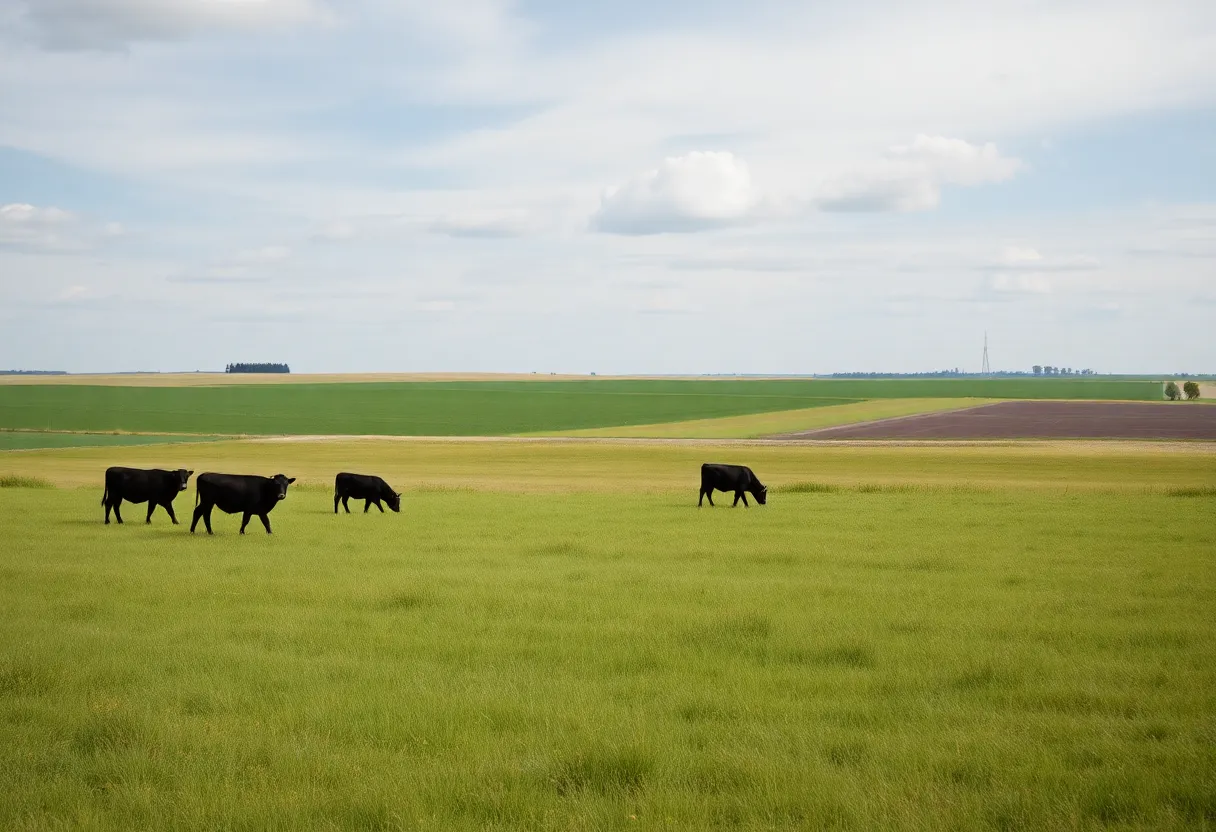Lincoln, October 22, 2025
In Lincoln, Nebraska, farmers and agricultural leaders are challenging President Trump’s proposal to increase beef imports, expressing concerns over the potential negative impact on local producers and the state’s beef economy. The local agricultural community fears that an influx of imported beef could lead to reduced prices, threaten rural livelihoods, and destabilize the economic framework of Nebraska’s robust cattle industry. With significant reliance on beef exports, industry advocates are urging Congress to reject the proposal.
Lincoln, NE – Nebraska Farmers Rally Against Proposed Increase in Beef Imports
Lincoln, Nebraska – Nebraska farmers and agricultural leaders are mounting strong opposition to President Trump’s recent proposal to increase beef imports, warning that it could severely harm local producers and destabilize the state’s beef economy. At a press conference held in Lincoln, the heart of Nebraska’s agricultural sector, industry representatives labeled the plan a puzzling decision that overlooks the economic realities faced by domestic beef producers.
The proposal, which aims to expand beef imports from international suppliers, has sparked immediate backlash from Nebraska’s farming community. As one of the nation’s leading beef-producing states, Nebraska relies heavily on its cattle industry for economic vitality. Local leaders argue that flooding the market with additional imported beef would drive down prices, making it increasingly difficult for American farmers to compete. This could lead to reduced incomes for producers and broader disruptions in rural communities that depend on beef production for jobs and stability.
Impacts on Local Markets and Producers
The core concern revolves around the potential devastation to local markets. Nebraska’s beef sector is already navigating challenges such as fluctuating export demands and rising production costs. Increasing imports, critics say, would exacerbate these issues by creating an oversupply of beef in the domestic market. This surplus could force producers to sell their cattle at lower prices, squeezing profit margins and potentially leading to farm closures or scaled-back operations.
Agricultural groups emphasize that Nebraska’s economy is deeply intertwined with beef exports. The state contributes significantly to the U.S. beef supply, with vast farmlands and feedlots supporting thousands of jobs. Any policy that undermines domestic production risks ripple effects across the supply chain, from ranchers and feeders to meat processors and transportation services. Rural areas, in particular, could face heightened economic pressure, as beef farming forms the backbone of many local livelihoods.
Lobbying Efforts and Calls for Congressional Action
In response to the proposal, Nebraska industry organizations are intensifying their lobbying efforts in Washington, D.C. These groups are urging Congress to reject the plan outright, highlighting the disproportionate impact it would have on states like Nebraska. By focusing on the protection of domestic markets, advocates aim to preserve the competitive edge of U.S. beef in both national and international arenas.
The press conference in Lincoln served as a platform for unifying voices within the agricultural sector. Leaders outlined how the proposal contradicts long-standing efforts to bolster American agriculture through trade policies that favor exports. They stressed the need for balanced approaches that support farmers without inviting unfair foreign competition. This unified stance is expected to fuel further discussions and potential legislative pushback in the coming weeks.
Broader Context of Nebraska’s Beef Industry
Nebraska’s position as a top beef-producing state underscores the stakes involved. The state boasts expansive cattle operations that contribute billions to the national economy annually. Beef exports have been a key driver of growth, allowing producers to access global markets and maintain stable revenues. However, recent trade tensions and policy shifts have already strained the industry, making additional import pressures particularly unwelcome.
Historically, Nebraska has played a pivotal role in shaping U.S. agricultural policy. From feedlot innovations to sustainable ranching practices, the state’s farmers have been at the forefront of the beef industry. The current opposition reflects a broader trend of agricultural stakeholders advocating for policies that prioritize domestic production amid evolving global trade dynamics.
Next Steps and Ongoing Developments
As the debate intensifies, Nebraska’s agricultural community is preparing for sustained advocacy. Meetings with lawmakers, public awareness campaigns, and data-driven analyses of the proposal’s effects are all on the horizon. The goal is to ensure that any trade decisions consider the full spectrum of impacts on American farmers.
This development comes at a time when the beef market is already under scrutiny for supply chain vulnerabilities exposed by global events. Nebraska’s response highlights the resilience and proactive nature of its farming sector, which continues to seek equitable solutions for long-term sustainability.
The opposition from Nebraska farmers signals a critical juncture for federal agricultural policy. With the state’s economy so closely tied to beef, the outcome of this proposal could influence not just local producers but the entire national livestock industry. Stakeholders remain vigilant, ready to engage in the legislative process to protect their interests.
(Word count: 612)
FAQ
What is the main opposition from Nebraska farmers?
Nebraska farmers are opposing President Trump’s proposal to increase beef imports, arguing it could devastate local markets and lower prices for producers.
Where did agricultural leaders voice their concerns?
Agricultural leaders called the proposal a ‘head-scratcher’ at a press conference in Lincoln.
Why is this proposal significant for Nebraska?
Nebraska, a top beef-producing state, relies on exports for economic stability.
What actions are industry groups taking?
Industry groups are lobbying Congress to reject the plan, emphasizing impacts on rural communities.
Key Features of Nebraska’s Beef Industry and the Import Proposal
| Feature | Description |
|---|---|
| Top Beef-Producing State | Nebraska is a leading producer of beef in the U.S., contributing significantly to the national supply. |
| Export Reliance | The state’s economy depends on beef exports for stability and growth. |
| Proposed Policy Impact | Increase in beef imports could lower prices and devastate local markets. |
| Rural Community Effects | Potential job losses and economic pressure in areas dependent on beef production. |
| Lobbying Response | Industry groups urging Congress to reject the plan. |


